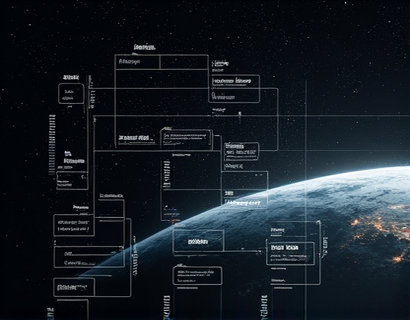Revolutionizing Transportation Logistics: Advanced Software for Streamlined Delivery and Cost-Effective Operations
In the rapidly evolving landscape of transportation and logistics, advanced software solutions are playing a pivotal role in transforming traditional supply chain processes. These innovative platforms are designed to optimize every aspect of logistics operations, from route planning and fleet management to inventory control and customer delivery. By leveraging cutting-edge technology, businesses in the transportation sector can achieve unprecedented levels of efficiency, accuracy, and cost savings. This article delves into the ways in which advanced software is revolutionizing the industry, providing a comprehensive overview of the benefits and applications of these sophisticated tools.
Optimizing Supply Chain Processes
The foundation of any successful logistics operation lies in an optimized supply chain. Advanced software solutions offer powerful tools to streamline these processes, ensuring that every step, from procurement to delivery, is executed with precision. One of the key features of these platforms is their ability to integrate various components of the supply chain into a single, cohesive system. This integration allows for real-time data sharing and synchronization, reducing delays and errors that can occur with manual or disjointed processes.
For instance, advanced software can automate procurement processes by predicting demand based on historical data and current market trends. This predictive analytics capability ensures that inventory levels are optimized, minimizing excess stock and reducing the risk of stockouts. Additionally, these systems can manage supplier relationships more effectively, providing insights into supplier performance and reliability, which helps in making informed decisions about partnerships.
Enhancing Delivery Accuracy
Accuracy in delivery is crucial for maintaining customer satisfaction and building trust. Advanced software solutions incorporate sophisticated algorithms and machine learning techniques to enhance the accuracy of delivery operations. One significant feature is the use of geospatial data and real-time tracking, which allows for precise route planning and monitoring. Drivers can receive up-to-date navigation instructions and alerts, ensuring they take the most efficient routes and arrive on time.
Furthermore, these platforms can integrate with warehouse management systems to optimize picking and packing processes. By providing detailed instructions and visual aids, the software minimizes the chances of errors during the fulfillment process. This level of precision not only improves delivery accuracy but also reduces the time and resources required for each shipment.
Reducing Operational Costs
Cost reduction is a primary concern for transportation and logistics companies, and advanced software offers numerous ways to achieve this goal. One of the most significant cost-saving benefits is the optimization of fleet operations. Advanced software can analyze driving patterns, vehicle maintenance schedules, and fuel consumption to identify areas for improvement. For example, route optimization algorithms can reduce fuel usage by minimizing distance and avoiding traffic congestion, leading to lower operational expenses.
Another cost-effective feature is the automation of administrative tasks. Manual data entry and paper-based processes are not only time-consuming but also prone to errors. By automating these tasks, advanced software reduces the need for manual labor and minimizes the risk of errors, thereby lowering operational costs. Additionally, the software can provide predictive maintenance alerts for vehicles, preventing costly breakdowns and extending the lifespan of fleet assets.
Improving Customer Service
In the competitive world of transportation and logistics, exceptional customer service is a key differentiator. Advanced software solutions enhance customer service by providing real-time visibility into the status of shipments. Customers can track their orders through a user-friendly interface, receiving notifications at key stages of the delivery process. This transparency builds trust and satisfaction, as customers can plan their activities with greater confidence.
Moreover, advanced software can handle customer inquiries and issues more efficiently. Chatbot technology and automated response systems can address common questions and resolve simple issues without the need for human intervention. This not only improves response times but also frees up customer service teams to focus on more complex tasks, further enhancing the overall customer experience.
Scalability and Flexibility
As businesses grow and evolve, their logistics needs change accordingly. Advanced software solutions are designed to be scalable and flexible, adapting to the unique requirements of each company. Whether a business is a small startup or a large multinational corporation, these platforms can be customized to fit their specific workflows and scale with their growth. This flexibility ensures that companies can invest in technology that will support their long-term goals without the need for frequent system overhauls.
Scalability also extends to the ability to integrate with other systems and third-party services. Advanced software can connect with ERP systems, CRM tools, and other industry-specific applications, creating a seamless ecosystem that enhances overall operational efficiency. This interconnectedness allows for a more holistic view of business operations, enabling better decision-making and strategic planning.
Environmental Sustainability
Environmental sustainability is becoming an increasingly important consideration for businesses in the transportation and logistics sector. Advanced software solutions can play a significant role in reducing the environmental impact of logistics operations. By optimizing routes and reducing idle time, these platforms help lower fuel consumption and greenhouse gas emissions. Additionally, the software can monitor and manage energy usage in warehouses, promoting more sustainable practices.
Some advanced systems even incorporate carbon footprint tracking and reporting features, allowing companies to measure and manage their environmental impact more effectively. This not only helps in meeting regulatory requirements but also appeals to environmentally conscious customers, enhancing the company's reputation and market position.
Case Studies and Real-World Applications
To better understand the practical benefits of advanced software in transportation and logistics, let's examine a few real-world applications. A major e-commerce company implemented a comprehensive logistics management system that integrated route optimization, real-time tracking, and warehouse automation. As a result, the company saw a 20% reduction in delivery times and a 15% decrease in operational costs. The improved accuracy in delivery also led to a significant increase in customer satisfaction ratings.
Another example is a fleet management company that adopted an advanced software platform for predictive maintenance and fleet optimization. The software analyzed vehicle data to predict maintenance needs, resulting in a 30% reduction in unscheduled downtime. This not only improved service reliability but also extended the lifespan of the fleet vehicles, leading to substantial cost savings.
Future Trends and Innovations
The landscape of transportation and logistics is continually evolving, and advanced software is at the forefront of these changes. Emerging technologies such as artificial intelligence, blockchain, and the Internet of Things (IoT) are being integrated into logistics software to further enhance efficiency and transparency. AI-driven analytics can provide deeper insights into operational data, enabling more proactive decision-making. Blockchain technology can ensure secure and transparent transactions, reducing the risk of fraud and errors. IoT devices can provide real-time data on vehicle and cargo conditions, enhancing monitoring and control.
Looking ahead, the integration of autonomous vehicles and drones is also on the horizon. Advanced software will play a crucial role in managing these new modes of transportation, optimizing their deployment and ensuring seamless integration with existing logistics networks. As these technologies mature, they will offer even greater opportunities for cost reduction, efficiency gains, and innovative service offerings.
Conclusion
Advanced software solutions are revolutionizing the transportation and logistics industry by optimizing supply chain processes, enhancing delivery accuracy, and reducing operational costs. These platforms provide a comprehensive approach to modernizing logistics operations, offering scalable and flexible tools that adapt to the unique needs of each business. By embracing these technological advancements, companies can gain a competitive edge, improve customer satisfaction, and contribute to a more sustainable future. As the industry continues to evolve, the role of advanced software will only become more critical, driving further innovation and efficiency in the years to come.










































